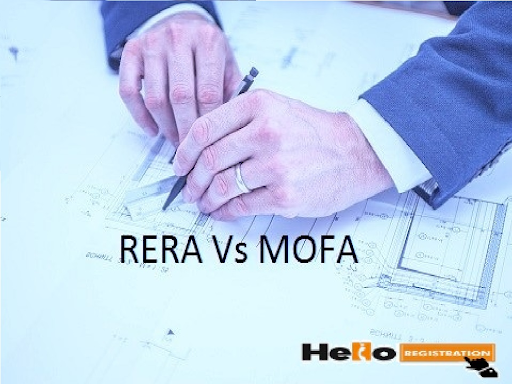The Maharashtra government is reportedly considering repealing the Maharashtra Ownership of Flats Act (MoFA), 1963, a landmark legislation that has protected homebuyers’ interests for over six decades. The proposal has sparked a heated debate between real estate developers, legal experts, and housing societies, as questions arise about what this move could mean for property rights in the state.
Also Read: How to Check Project Details in Maharera
Why Is the Government Planning to Repeal the MoFA Act?
According to reports, the state government is evaluating whether MoFA has become redundant after the implementation of the Real Estate (Regulation and Development) Act (RERA) in 2017.
Developers argue that both laws cover similar aspects—such as project disclosures, fund usage, and buyer protection—creating overlapping provisions that lead to confusion and procedural delays.
The move follows persistent representations from CREDAI-MCHI, the apex body of real estate developers in Maharashtra. The group has been urging the government since 2020 to repeal MoFA, citing “dual compliance” issues for builders. The state cooperation department has already sought the cooperation commissioner’s opinion, who is expected to submit a detailed report soon.
What Exactly Is the MoFA Act?
The Maharashtra Ownership of Flats Act (MoFA), 1963, was one of the earliest laws in India to safeguard flat buyers. It made it mandatory for builders to:
- Provide written agreements specifying the layout plan, carpet area, total cost, and possession date.
- Use the money collected from buyers only for the same project.
- Form housing societies and transfer the ownership of land and building to the buyers once construction is complete.
Essentially, MoFA was designed to ensure that buyers got what they were promised, shielding them from misleading claims and project delays.
Also Read: MahaRERA Latest Rules Ensuring Clearer Delivery Timelines and Homebuyer Protection
What Does the RERA Act Do Differently?
The RERA Act, introduced in Maharashtra through MahaRERA in 2017, was a game-changer for the real estate sector. It aims to make homebuying transparent and accountable.
Key provisions include:
- Mandatory registration of all housing projects before advertising or selling units.
- Full disclosure of approved layouts, project timelines, and financial details.
- A system for homebuyers to track project progress online through the MahaRERA portal.
- Strict regulations ensuring that 70% of buyer funds are used exclusively for the registered project.
- A grievance redressal mechanism enabling quick dispute resolution.
RERA brought transparency, accountability, and digital monitoring into a space once plagued by unregulated practices.
Why Are Developers Calling for the Repeal of MoFA?
Developers claim that having both MoFA and RERA in effect leads to duplication and confusion. They argue that RERA is comprehensive enough to regulate the real estate sector effectively on its own.
Former CREDAI-MCHI president Nayan Shah explained that the coexistence of two similar laws has created unnecessary complexities:
“RERA was introduced to modernize real estate regulation. Many MoFA provisions now overlap with RERA. If deemed conveyance is a concern, the same can be addressed within RERA itself.”
Developers insist that MoFA’s continuation adds no tangible benefit, especially when most new projects are registered under RERA.
Also Read: What Rights Do Buyers Have Under RERA in 2025?
What Is ‘Unilateral Deemed Conveyance’ and Why Is It Important?
One of MoFA’s key features is the Unilateral Deemed Conveyance clause.
This provision allows a housing society to legally transfer the ownership of land and building in its name—even without the builder’s cooperation—if the developer delays or refuses to execute the conveyance deed.
This mechanism has been a lifeline for thousands of housing societies in Maharashtra, enabling them to gain rightful ownership after years of builder neglect.
If MoFA is repealed without incorporating this clause into RERA, experts warn that a major legal vacuum could arise, leaving older societies without a clear remedy.
What Are Legal Experts Saying About the Proposed Repeal?
Legal professionals are urging caution. They argue that MoFA’s repeal could unintentionally weaken buyer protections—especially for societies formed before RERA came into force.
Advocate and solicitor Trupti Daphtary highlighted this concern:
“The MoFA provision for unilateral deemed conveyance should continue for societies not registered under RERA. For RERA-registered projects, the society can approach the RERA authority. Repealing MoFA entirely would create a vacuum, as RERA lacks a corresponding clause for pre-RERA projects.”
Experts believe that while RERA is robust, MoFA’s Maharashtra-specific provisions—like those ensuring the formation of housing societies and clear land conveyance—should not be discarded without suitable replacement mechanisms.
Could a Partial Repeal or Integration Be the Middle Path?
Some policy observers suggest a balanced approach—rather than repealing MoFA entirely, the government could retain key buyer-protection clauses and integrate them into RERA.
This would preserve the safeguards that have historically benefited flat purchasers while simplifying compliance for developers.
The government’s final decision will likely depend on the commissioner’s report, which is expected to weigh the practical implications for both homebuyers and builders.
Also Read: What Penalties Do Developers Face for RERA Violations in 2025?
The Bottom Line
The debate over MoFA’s repeal is not just about scrapping an old law—it’s about defining how Maharashtra’s real estate ecosystem evolves in the era of RERA.
While developers seek uniformity and ease of compliance, homebuyers and housing societies fear losing the protective legal umbrella that MoFA provided for decades.
Until a final call is made, one thing remains clear: the outcome of this policy decision will reshape how property ownership, society formation, and land conveyance are handled in Maharashtra for years to come.
The Maharashtra government is reportedly considering repealing the Maharashtra Ownership of Flats Act (MoFA), 1963, a landmark legislation that has protected homebuyers’ interests for over six decades. The proposal has sparked a heated debate between real estate developers, legal experts, and housing societies, as questions arise about what this move could mean for property rights in the state.
Also Read: How to Check Project Details in Maharera
Why Is the Government Planning to Repeal the MoFA Act?
According to reports, the state government is evaluating whether MoFA has become redundant after the implementation of the Real Estate (Regulation and Development) Act (RERA) in 2017.
Developers argue that both laws cover similar aspects—such as project disclosures, fund usage, and buyer protection—creating overlapping provisions that lead to confusion and procedural delays.
The move follows persistent representations from CREDAI-MCHI, the apex body of real estate developers in Maharashtra. The group has been urging the government since 2020 to repeal MoFA, citing “dual compliance” issues for builders. The state cooperation department has already sought the cooperation commissioner’s opinion, who is expected to submit a detailed report soon.
What Exactly Is the MoFA Act?
The Maharashtra Ownership of Flats Act (MoFA), 1963, was one of the earliest laws in India to safeguard flat buyers. It made it mandatory for builders to:
- Provide written agreements specifying the layout plan, carpet area, total cost, and possession date.
- Use the money collected from buyers only for the same project.
- Form housing societies and transfer the ownership of land and building to the buyers once construction is complete.
Essentially, MoFA was designed to ensure that buyers got what they were promised, shielding them from misleading claims and project delays.
Also Read: MahaRERA Latest Rules Ensuring Clearer Delivery Timelines and Homebuyer Protection
What Does the RERA Act Do Differently?
The RERA Act, introduced in Maharashtra through MahaRERA in 2017, was a game-changer for the real estate sector. It aims to make homebuying transparent and accountable.
Key provisions include:
- Mandatory registration of all housing projects before advertising or selling units.
- Full disclosure of approved layouts, project timelines, and financial details.
- A system for homebuyers to track project progress online through the MahaRERA portal.
- Strict regulations ensuring that 70% of buyer funds are used exclusively for the registered project.
- A grievance redressal mechanism enabling quick dispute resolution.
RERA brought transparency, accountability, and digital monitoring into a space once plagued by unregulated practices.
Why Are Developers Calling for the Repeal of MoFA?
Developers claim that having both MoFA and RERA in effect leads to duplication and confusion. They argue that RERA is comprehensive enough to regulate the real estate sector effectively on its own.
Former CREDAI-MCHI president Nayan Shah explained that the coexistence of two similar laws has created unnecessary complexities:
“RERA was introduced to modernize real estate regulation. Many MoFA provisions now overlap with RERA. If deemed conveyance is a concern, the same can be addressed within RERA itself.”
Developers insist that MoFA’s continuation adds no tangible benefit, especially when most new projects are registered under RERA.
Also Read: What Rights Do Buyers Have Under RERA in 2025?
What Is ‘Unilateral Deemed Conveyance’ and Why Is It Important?
One of MoFA’s key features is the Unilateral Deemed Conveyance clause.
This provision allows a housing society to legally transfer the ownership of land and building in its name—even without the builder’s cooperation—if the developer delays or refuses to execute the conveyance deed.
This mechanism has been a lifeline for thousands of housing societies in Maharashtra, enabling them to gain rightful ownership after years of builder neglect.
If MoFA is repealed without incorporating this clause into RERA, experts warn that a major legal vacuum could arise, leaving older societies without a clear remedy.
What Are Legal Experts Saying About the Proposed Repeal?
Legal professionals are urging caution. They argue that MoFA’s repeal could unintentionally weaken buyer protections—especially for societies formed before RERA came into force.
Advocate and solicitor Trupti Daphtary highlighted this concern:
“The MoFA provision for unilateral deemed conveyance should continue for societies not registered under RERA. For RERA-registered projects, the society can approach the RERA authority. Repealing MoFA entirely would create a vacuum, as RERA lacks a corresponding clause for pre-RERA projects.”
Experts believe that while RERA is robust, MoFA’s Maharashtra-specific provisions—like those ensuring the formation of housing societies and clear land conveyance—should not be discarded without suitable replacement mechanisms.
Could a Partial Repeal or Integration Be the Middle Path?
Some policy observers suggest a balanced approach—rather than repealing MoFA entirely, the government could retain key buyer-protection clauses and integrate them into RERA.
This would preserve the safeguards that have historically benefited flat purchasers while simplifying compliance for developers.
The government’s final decision will likely depend on the commissioner’s report, which is expected to weigh the practical implications for both homebuyers and builders.
Also Read: What Penalties Do Developers Face for RERA Violations in 2025?
The Bottom Line
The debate over MoFA’s repeal is not just about scrapping an old law—it’s about defining how Maharashtra’s real estate ecosystem evolves in the era of RERA.
While developers seek uniformity and ease of compliance, homebuyers and housing societies fear losing the protective legal umbrella that MoFA provided for decades.
Until a final call is made, one thing remains clear: the outcome of this policy decision will reshape how property ownership, society formation, and land conveyance are handled in Maharashtra for years to come.







